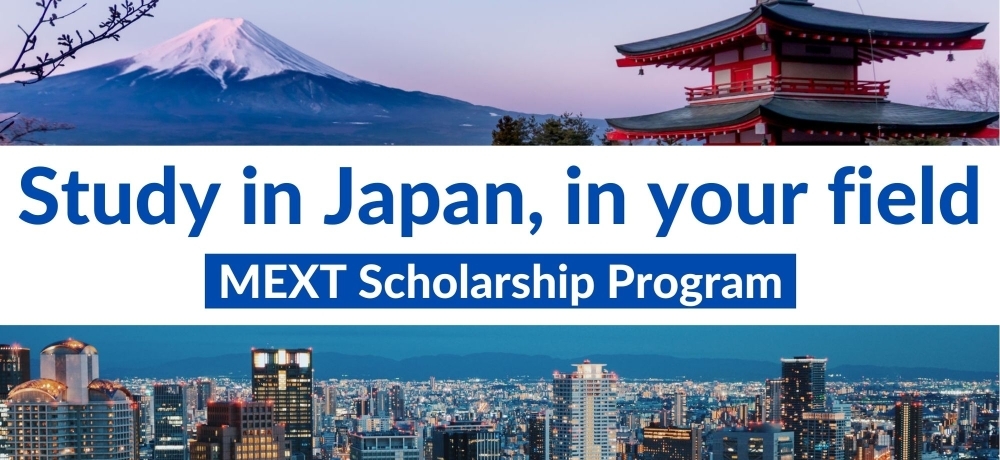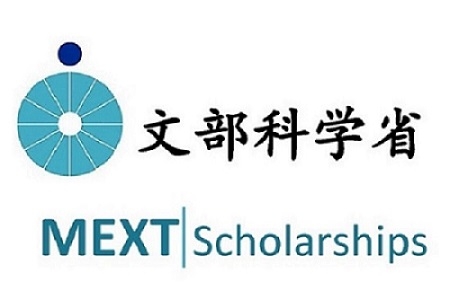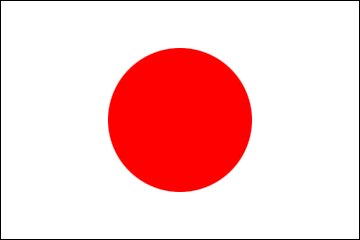MEXT Scholarship Program
2026/2/18

On this page: |

The Ministry of Education, Culture, Sports, Science and Technology (in Japanese: Monbukagakusho, English acronym: MEXT) offers scholarships to Canadian students wishing to pursue their studies at a Japanese university.
* The selection process may be cancelled or applicants may be unable to travel to Japan even after being selected for the MEXT Scholarship Program due to measures taken in response to an outbreak of an infectious disease or other reasons.
THE SCHOLARSHIP COVERS:
1. Full tuition
2. Monthly allowance
3. Round-trip flight between Japan and Canada
4. Japanese Language Training
Applications must be sent to the nearest Japanese diplomatic mission. For detailed information, please contact your jurisdiction’s diplomatic mission:
- Embassy of Japan in Ottawa (Ottawa/Gatineau)
- Consulate General of Japan in Vancouver (British Columbia and Yukon residents)
- Consulate General of Japan in Calgary (Alberta, Saskatchewan, Manitoba, Northwest Territories and Nunavut residents)
- Consulate General of Japan in Toronto (Ontario residents)
- Consulate General of Japan in Montreal Quebec, New Brunswick, Prince Edward Island, Nova Scotia, Newfoundland and Labrador residents)
If you reside in the Ottawa-Gatineau region, send applications and related documents to:
MEXT Scholarship Program Section
Embassy of Japan in Canada
255 Sussex Drive
Ottawa, ON, K1N 9E6
For Ottawa-Gatineau Residents:
If you have any questions regarding the MEXT Scholarship Program, please contact us at info@ot.mofa.go.jp.
Once your application has been sent, please inform our office by email at info@ot.mofa.go.jp.
* Please retain digital copies of the application form for your records. In certain circumstances, such as delays in delivery due to unforeseen issues, we may request that you submit the digital files.

Below are the three categories of scholarships available for Canadian students.
Undergraduate Students
For undergraduate studies in certain fields of study (please consult the guidelines for the list of fields of study available)
Application for 2025: Closed
Research Students
For graduate studies (non-degree, masters or doctorate) in any university subjects.
Application for 2025: Closed
Japanese Studies Students
For undergraduate studies in a Japan-related field of study (student must already be majoring in Japanese language and/or culture)
Application for 2026: Closed

| Currently Open for Application | No (Below is the information from our last recruitment cycle for your reference) |
| Duration | 5 years, beginning in April 2026 For those majoring in medicine, dentistry, veterinary medicine or a six-year course in pharmacy, the term of the scholarship is 7 years. (The first year is language training.) |
| Outline of eligibility |
|
| Departure date | April 2026 |
| Placement at University | Designated by MEXT, based on your fields and subjects choices |
| Application deadline | Friday, May 30, 2025 |
| Selection process | 1. Application documents review 2. Examination (Japanese, English, Mathematics and Science*) and Interview: July * Only for applicants who choose Natural Science field 3. Results of the 1st screening notification: Early August 4. Acceptance notification: December - following February |
| Complete instruction | Please see Application Guideline. Carefully check required documents for the application described in the Application Guidelines. * Application forms can be downloaded here |

| Currently Open for Application | No (Below is the information from our last recruitment cycle for your reference) |
| Duration | 2 years, beginning in April 2026 or 18 months, beginning in October 2026 Extension may be possible if you proceed to a further degree program. |
| Outline of eligibility |
|
| Departure date | April or September/October 2026 |
| Placement at University | Designated by MEXT, based on your admission or a letter of provisional acceptance you obtain from Japanese universities. |
| Application deadline | Friday, May 23, 2025 |
| Selection process | 1. Application documents review 2. Examination (Japanese and English) and Interview: early to mid-July 3. Results of the 1st screening notification: late July 4. Obtain letters of provisional acceptance 5. Acceptance notification: following January - February |
| Complete instruction | Please see Application Guidelines. Carefully check required documents for the application described in the Application Guidelines. * Application forms can be downloaded here. |
| Currently Open for Application | No (Below is the information from our last recruitment cycle for your reference) |
| Duration | 1 year, beginning from October 2026. |
| Outline of eligibility |
|
| Departure date | September or October 2026 |
| Placement at University |
Designated by MEXT, taking into consideration your Japanese language ability, the result of written examination and specialized courses you wish to take. |
| Application deadline | Wednesday, February 11, 2026 |
| Selection process | 1. Documents review 2. Examination (Japanese) and interview : Mid or late February, 2026 3. Result notification: August 2026 |
| Complete instruction | Please see Application Guidelines. Carefully check required documents for the application described in the Application Guidelines. *Application forms can be downloaded from here. |
Q: What should I do to begin applying to the program?
A: First of all, decide which level is the most appropriate for you—Undergraduate Students, Japanese Studies Students or Research Students. Secondly, decide on a major field of study, which is like declaring your major for undergraduate study in Canada. Major fields of study may include subjects in the areas of Social Sciences, Humanities or Natural Sciences. For example, one major field of study might be Computer Science Research in Artificial Intelligence, which falls under the Natural Sciences category.
Q: For Research Students, how can I choose which university to apply to in Japan?
A: Ask your professors if they can suggest universities to apply to in Japan. If your professor or past professors are not able to assist you in deciding where to go, you may go to the Japan Student Services Organization (JASSO) website (www.jasso.go.jp) where they have a search engine of all the universities in Japan. The search engine can help you find a university which offers the program of study you wish to pursue.
Q: When does the academic year begin and end in universities in Japan?
A: The academic year in universities in Japan begins in April and ends in March of the following year. In most cases, the year is divided into two semesters, the first lasting from April to September and the second from October to March.
Q: I want to apply to a technical college or vocational school in Japan, how do I do that?
A: Unfortunately, specialized training and vocational education (such as community colleges and vocational schools) are not covered by the MEXT scholarship program in Canada. If you are unsure whether the institution that interests you is a participating institution, please contact the nearest Japanese diplomatic mission (Embassy or Consulate-General).
Q: I am a Canadian student currently studying outside of Canada. How do I apply and do I have to return to Canada for the interview and necessary testing?
A: You must obtain the application forms from the Study in Japan website and submit them to either the Embassy or Consulate General which is closest to your home city. Yes, in principle, you must return to Canada for the interview and testing.
Q: I need the application form in Microsoft Excel or Word format.
A: Unfortunately, only PDF files are available for security reasons.
Q: I don’t have enough space to fill in my research plan (motivation, etc.) in the PDF file.
A: You can write your answer using a separate sheet of paper. Please make sure to indicate in the corresponding place in the application form that a separate sheet will be joined (i.e. “please refer to attachment x”), and clearly identity the question number on the sheet and attach it to the application form.
Q: I entered primary school in September 2000 and finished it in June 2006. In this case, my duration of education is 5 year and 10 month. Is my understanding correct?
A: In case you completed your curriculum by following your national/provincial education system, you can include extended leave such as summer vacation and count your duration of education as 6 years. On the other hand, if you terminated your education mid-term for personal reasons, the duration should be 5 year and 10 months. If you have any particular reasons, please consult the nearest Japanese diplomatic mission (Embassy or Consulate-General) for more information.
Q: My documents (certification, transcript, degree, etc.) are in a language other than Japanese or English. Do I need to provide a translation?
A: Yes. A translation in either English or Japanese should be attached. This translation can be homemade or done by an adequate translator. This includes documents in French.
*Please submit documents in English whenever possible.
Q: What if I cannot obtain a required document by the deadline?
A: If you have any issues or concerns, please contact the nearest Japanese diplomatic mission (Embassy or Consulate-General) handling your jurisdiction without delay.
Q: Can my university/referee send a document directly to the Embassy of Japan/Consulate-General of Japan by email?
A: In principle, the Embassy of Japan in Canada cannot receive documents from a third-party and communicates with candidates directly. If you cannot obtain a document by the deadline, please contact the Japanese diplomatic mission of your jurisdiction by email and clearly explain your situation. If you are a resident of the Ottawa-Gatineau region, please contact us at info@ot.mofa.go.jp.
Q: Can I submit more than one academic letter of recommendation?
A: No. Please refrain from submitting more than the requested number of letters of recommendation with your application. If more than one academic letter of recommendation is submitted, only one will be considered and the others will be discarded.

Are you a former MEXT participants? Did you previously study in Japan under another programme or as a privately financed student? Do you want to get in touch with other alumni in the Ottawa/Gatineau region? Contact us at info@ot.mofa.go.jp.
A: First of all, decide which level is the most appropriate for you—Undergraduate Students, Japanese Studies Students or Research Students. Secondly, decide on a major field of study, which is like declaring your major for undergraduate study in Canada. Major fields of study may include subjects in the areas of Social Sciences, Humanities or Natural Sciences. For example, one major field of study might be Computer Science Research in Artificial Intelligence, which falls under the Natural Sciences category.
Q: For Research Students, how can I choose which university to apply to in Japan?
A: Ask your professors if they can suggest universities to apply to in Japan. If your professor or past professors are not able to assist you in deciding where to go, you may go to the Japan Student Services Organization (JASSO) website (www.jasso.go.jp) where they have a search engine of all the universities in Japan. The search engine can help you find a university which offers the program of study you wish to pursue.
Q: When does the academic year begin and end in universities in Japan?
A: The academic year in universities in Japan begins in April and ends in March of the following year. In most cases, the year is divided into two semesters, the first lasting from April to September and the second from October to March.
Q: I want to apply to a technical college or vocational school in Japan, how do I do that?
A: Unfortunately, specialized training and vocational education (such as community colleges and vocational schools) are not covered by the MEXT scholarship program in Canada. If you are unsure whether the institution that interests you is a participating institution, please contact the nearest Japanese diplomatic mission (Embassy or Consulate-General).
Q: I am a Canadian student currently studying outside of Canada. How do I apply and do I have to return to Canada for the interview and necessary testing?
A: You must obtain the application forms from the Study in Japan website and submit them to either the Embassy or Consulate General which is closest to your home city. Yes, in principle, you must return to Canada for the interview and testing.
Q: I need the application form in Microsoft Excel or Word format.
A: Unfortunately, only PDF files are available for security reasons.
Q: I don’t have enough space to fill in my research plan (motivation, etc.) in the PDF file.
A: You can write your answer using a separate sheet of paper. Please make sure to indicate in the corresponding place in the application form that a separate sheet will be joined (i.e. “please refer to attachment x”), and clearly identity the question number on the sheet and attach it to the application form.
Q: I entered primary school in September 2000 and finished it in June 2006. In this case, my duration of education is 5 year and 10 month. Is my understanding correct?
A: In case you completed your curriculum by following your national/provincial education system, you can include extended leave such as summer vacation and count your duration of education as 6 years. On the other hand, if you terminated your education mid-term for personal reasons, the duration should be 5 year and 10 months. If you have any particular reasons, please consult the nearest Japanese diplomatic mission (Embassy or Consulate-General) for more information.
Q: My documents (certification, transcript, degree, etc.) are in a language other than Japanese or English. Do I need to provide a translation?
A: Yes. A translation in either English or Japanese should be attached. This translation can be homemade or done by an adequate translator. This includes documents in French.
*Please submit documents in English whenever possible.
Q: What if I cannot obtain a required document by the deadline?
A: If you have any issues or concerns, please contact the nearest Japanese diplomatic mission (Embassy or Consulate-General) handling your jurisdiction without delay.
Q: Can my university/referee send a document directly to the Embassy of Japan/Consulate-General of Japan by email?
A: In principle, the Embassy of Japan in Canada cannot receive documents from a third-party and communicates with candidates directly. If you cannot obtain a document by the deadline, please contact the Japanese diplomatic mission of your jurisdiction by email and clearly explain your situation. If you are a resident of the Ottawa-Gatineau region, please contact us at info@ot.mofa.go.jp.
Q: Can I submit more than one academic letter of recommendation?
A: No. Please refrain from submitting more than the requested number of letters of recommendation with your application. If more than one academic letter of recommendation is submitted, only one will be considered and the others will be discarded.

Are you a former MEXT participants? Did you previously study in Japan under another programme or as a privately financed student? Do you want to get in touch with other alumni in the Ottawa/Gatineau region? Contact us at info@ot.mofa.go.jp.
For more details about the alumni associations from other Canadian jurisdictions, please follow the links below.
Japanese Scholarship Alumni Association Quebec/Atlantic
Japanese Government Scholarship Alumni Association of Ontario
MEXT Scholarship Alumni Association of Prairie Provinces
MEXT Scholarship Alumni Association of British Columbia and Yukon
To learn more about the Alumni Network around the world, please click here.
For a list of international alumni associations, please click here.



